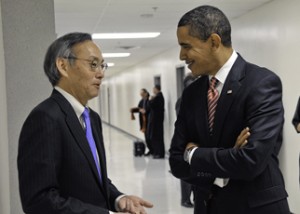 The U.S. needs to maintain its lead on innovation in the energy sector given the rise of China’s growing energy needs and its commitment to cleantech, according to Secretary of Energy Steven Chu.
The U.S. needs to maintain its lead on innovation in the energy sector given the rise of China’s growing energy needs and its commitment to cleantech, according to Secretary of Energy Steven Chu.
Chu likened the energy race to the “Sputnik” movement, an era in which the country was racing to catch up after the Soviet Union eked out an early lead on satellite deployments, sparking concern from President Eisenhower. It was also producing more graduates in science and engineering than the U.S. (Sound familiar?) Chu made the remarks in a speech and a conference call with reporters this week.
Here’s a couple of interesting things he had to say:
On solar startup Solyndra, which has reportedly taken nearly $1 billion in funding and received a $535 million conditional loan guarantee from the Department of Energy for its second factory, a decision that is now under criticism. The company has come under tough pricing competition from Chinese manufacturers, and recently closed its first facility, laying off 40 workers.
On the call Chu continued to stress the importance of policymaking and government support (like loan guarantees) for renewable technologies. Meanwhile, his office sent us a stilted official reply by email:
“Solyndra now plans to double rather than triple production of solar panels by 2013, and construction for the company’s new facility is ahead of schedule. We take our responsibility to protect taxpayer interests very seriously and will continue to work with Solyndra to help them find solutions to current and future challenges.”
On the dramatic decrease in cleantech investing from venture capitalists and how the U.S. can continue to drive investment:
In a follow-up note to VentureBeat’s questions, Chu’s office pointed out that the DOE’s loan program has offered $25 billion in commitments in the last 18 months, and created 57,000 green jobs.
“This represents a greater investment in clean energy generation projects than the entire private sector made in 2009, and almost as much as was invested in such projects in 2008 – the peak financing year to date … Loan guarantees are crucial.”
On China’s renewable energy “playbook”:
“China’s not spending state funds…if you look in detail, what they’re doing, loan guarantees preferential tax treatment — it looks like it’s out of an American playbook.”
On what the private sector needs to be encouraged to invest:
Chu says that what he’s heard from private sector investors is nervousness about what happens “if the rules change five years from now,” altering the landscape and economics of their original investment.
“What the US needs to do is make long-term policies. It’s better to have a sustained long-term policy rather than lavish policy that lasts for only a year or two,” Chu said. One example of the latter is a solar grant program that will expire this year and provided up to 30 percent of a project’s costs. The program’s chances for renewal look slim, and has set off a scramble in California to approve solar projects before the program ends.
Later, via email, Chu’s office emphasized loan guarantees as a “crucial” part of what they do to spur renewable energy projects.
On the possibility of losing out to competition from cleantech companies in Asia and Europe:
“Japan and Korea and China are going in this direction, saying ‘This is our future,’ and if we in the states don’t go in this direction, I’m afraid we’ll be increasingly importing many of the technologies that we could have been exporting,” Chu said. He gave an example of how he recently installed a tankless water heater in his home.
“There were no American manufacturers. There was a Korean one, Japanese one, European ones. Kind of scary.”
On attacks from conservatives who seem to be turning against the smart grid and, in Rush Limbaugh’s case, green cars like the Chevrolet Volt:
Chu again framed the discussion as one about innovation, American competitiveness and the future of energy. He pointed again to the advances and investment that other countries are making in renewable energies and infrastructure.
“Ultimately, the American public has to decide. Does everyone else know something we don’t know, or do we know something everyone else doesn’t know?”
On the U.S.’s competitive edge:
“This is private enterprise, it has to be driven by the private sector. We lead … but leads can be tenuous. You can lose them; you have to fight to gain them back. Once lost, it isn’t lost forever. We lost the lead in airplanes, we got it back.”
[Image via Wikipedia Commons]

